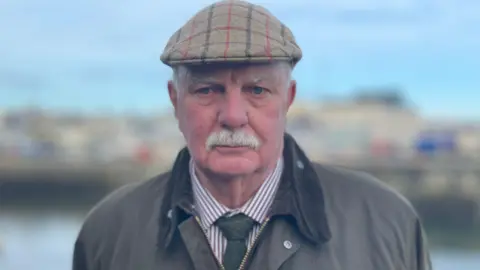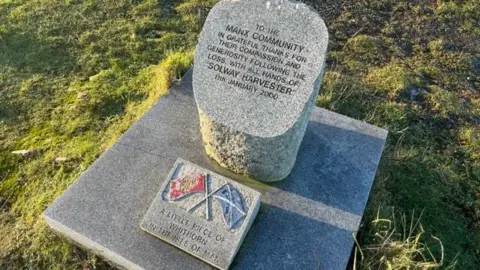Solway Harvester tragedy 'still felt' 25 years on
 BBC
BBCThe loss of seven fishermen in Manx waters "is still keenly felt" a quarter of a century after the Solway Harvester tragedy, the chief minister has said.
The crewmen, from the Isle of Whithorn area of Dumfries and Galloway, died when the the scallop dredger sank off the coast of Douglas on 11 January 2000.
Alfred Cannan said: "On this poignant anniversary, we remember and pay tribute to the men who lost their lives".
On Sunday, he is set to lay a wreath at a permanent memorial on Douglas Head, which was gifted by the Whithorn community to the island for its recovery of the men's bodies.
Skipper Andrew Mills (known as Craig), 29, his brother Robin Mills, 33, their cousin David Mills, 17, Martin Milligan, 26, John Murphy, 22, David Lyons, 18, and Wesley Jolly, 17 died when the boat sank in stormy seas while heading for shelter in Ramsey Bay.
The bodies of all seven men were found on board the 21m (70ft) long vessel on 15 January 2000.
Former Detective Chief Inspector Dudley Butt headed up the recovery operation for the Isle of Man Constabulary.
He said the team felt "a huge relief" to find all seven bodies on the vessel because to have to tell the families not all of the men had been recovered "would have been devastating for them".
Mr Butt said passing on the news to the families, who had travelled to the island, "was so emotional".
"It was the most emotional moment of my career, the fact that we achieved what we set out to achieve, what we promised to achieve, and helped the families to come to terms with what had happened," he said.

The men's bodies, which were draped in a Scottish flag and a Manx Flag, were brought to shore in Douglas, where a lone piper played from the harbourside.
Stephen Carter, the pilot of the boat that brought the vessel in, said it was a "very moving operation".
He said: "It was very, very sad but it was perfectly appropriate and poignant.
"Great credit must go the government of the time, they were prepared to do the right thing, they stepped up to the mark."
Mr Carter was also involved in towing the wreckage to Ramsey Harbour when it had been raised from the seabed in June the same year in a £1m operation funded by the Manx Government.
Hundreds of people lined the pier to pay their respects as the vessel was brought in.
"The most noticeable thing was the complete silence, there was no noise, no-one talking, all you could hear was the engines of the two tug boats," he said.
"The people of the Isle of Man really felt for the people of Whithorn, and the families of the fishermen."

The scallop dredger remained in Douglas Harbour until it was eventually scrapped in 2013 by Mr Carter's firm, following instructions from the government.
Marking the 25th anniversary of the tragedy, Mr Cannan said: "Our thoughts are with their families and friends and with the close-knit fishing communities of Galloway – particularly Whithorn, Garlieston, and the Isle of Whithorn – where the crew were from."
"As a seafaring community with a proud fishing heritage, the tragedy and loss are still keenly felt in the Isle of Man."
Why not follow BBC Isle of Man on Facebook and X? You can also send story ideas to [email protected]
